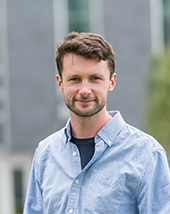Skip to content. | Skip to navigation
Personal tools

- Contact Us |
- Seminars |
- Donate

Lunenfeld-Tanenbaum
Research Institute
Mount Sinai Hospital
Joseph & Wolf Lebovic Health Complex
L5-230 - 60 Murray St.
Toronto, Ontario
M5T 3L9
Tel.: 416-586-4800 ext.5824
► Web of Science Researcher ID
Z-5291-2019
Dr. Kieran Campbell
INVESTIGATOR
Dr. Kieran Campbell is an investigator at the Lunenfeld-Tanenbaum Research Institute and an assistant professor at the Department of Molecular Genetics, University of Toronto.
His research focusses on Bayesian models and machine learning for high dimensional biomedical data, including single-cell and cancer genomics. Recently, he has led efforts to develop statistical machine learning methodology to integrate single-cell RNA and DNA sequencing data to uncover the effects of tumour clonal identity on gene expression, as well as methods to automatically delineate the tumour microenvironment from single-cell RNA-sequencing data. Such findings can improve our understanding of cancer progression and of why certain tumours are resistant to therapies, leading to relapse.
Dr. Campbell was most recently a Banting postdoctoral fellow at the Department of Statistics, University of British Columbia and Department of Molecular Oncology, BC Cancer Agency. He obtained his D. Phil in computational and statistical genomics at the University of Oxford under the supervision of Christopher Yau.
At a Glance
Investigator at the Lunenfeld-Tanenbaum Research Institute
Expertise in statistical and machine learning modelling of high-dimensional biomedical data
Awarded Banting fellowship to understand the origins of cancer resistance using statistical modelling of single-cell data
Postdoctoral fellowships from the UBC Data Science Institute and Canadian Statistical Sciences Institute (CANSSI)
Research program includes both statistical machine learning methodology as well as applied data analysis to uncover mechanisms in disease genomics.
Major Research Activities
Dr. Campbell’s ongoing research interests concern applications of statistical machine learning in biomedical research. In particular, he is focussed on
(i) single-cell and spatial approaches to understanding cancer progression and resistance,
(ii) reconstructing disease progression trajectories from genomic and imaging data,
(iii) machine learning models to automate biomedical data analysis.



